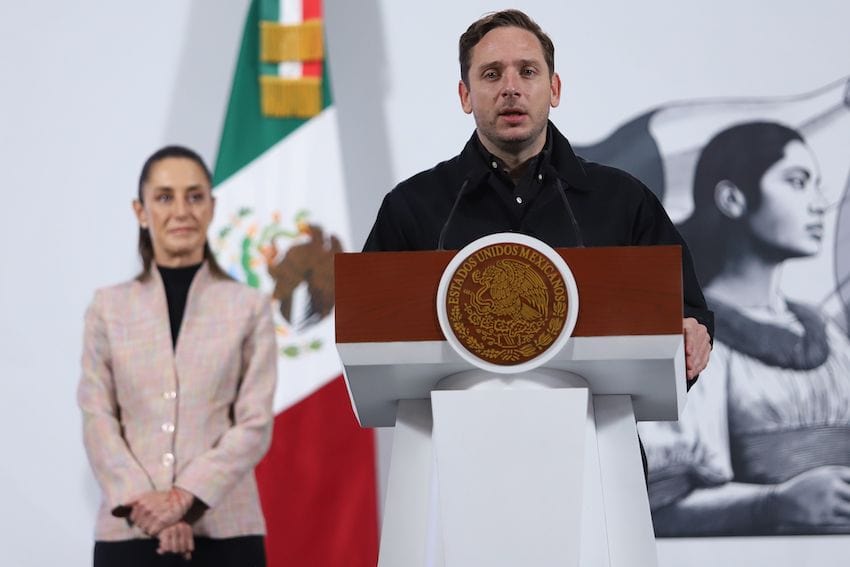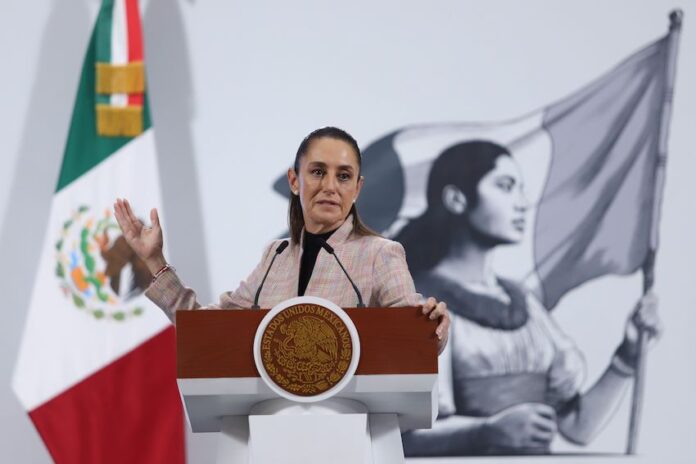The opening of new public hospitals and workforce productivity were among the issues President Claudia Sheinbaum spoke about at her Tuesday morning press conference.
She also responded to a question about the new public transport cable car line set to be built in southern Mexico City.
Here is a recap of the president’s July 29 mañanera.
A 92-billion-peso investment in health care facilities
At the start of her press conference, Sheinbaum announced that Deputy Health Minister Eduardo Clark would speak about the new public hospitals that have opened since she took office last October, as well as those that will open before the end of the year.
“We’re talking about 31 new hospitals in the country,” she said, adding that the construction of “the majority of them” began during the 2018-24 government of former president Andrés Manuel López Obrador.
“They are 31 new, very important hospitals,” Sheinbaum said, noting that they are, or will be, operated by one of the Mexican Social Security Institute (IMSS), the Institute for Social Security and Services for State Workers (ISSSTE) or the IMSS Bienestar healthcare agency.
Clark noted that the government has already inaugurated 13 new public hospitals and nine public health care centers, or clinics, since it took office last October.
He said that an additional 18 hospitals and three clinics will open before the end of the year.

Among the 13 hospitals that have opened since October are ones in Ciudad Juárez, Tijuana, Ensenada and Orizaba.
Among the 18 slated to open before the end of 2025 are ones in Mexico City, Puebla, Tuxtla Gutiérrez, Ciudad del Carmen, Guanajuato city, Hermosillo, Acapulco and Mérida.
Clark noted that an additional 20 public hospitals are scheduled to open in 2026 and 2027.
Those 20 hospitals — some of which are already under construction — will be located in cities including Mexico City, Los Cabos, Oaxaca city, Saltillo, Culiacán and Chetumal.
“As you can see,” Clark said, “it’s an incredibly ambitious infrastructure plan.”
The deputy health minister also noted that the government is upgrading 256 operating rooms at public hospitals.
Sheinbaum said that the government is also hiring “all the specialist doctors and nurses” needed to perform surgeries in the upgraded operating rooms.
She said that the investment in the 31 hospitals that will have opened by the end of 2025 is around 50 billion pesos, while the outlay for the 20 to open in 2026 and 2027 is about 40 billion pesos.
The upgrades to the operating rooms will cost around 2.5 billion pesos, Sheinbaum said.
Combined, the investment the president referred to adds up to 92.5 billion pesos (US $4.9 billion).
Sheinbaum defends Mexican workers after reporter highlights Mexico has second second-lowest productivity in OECD
A reporter noted that Mexico ranked second to last for productivity among the 38 member countries of the Organization for Economic Cooperation and Development (OECD).
Labour Productivity
Top 5 Countries
Ireland🇮🇪
Norway🇳🇴
Luxembourg🇱🇺
Belgium🇧🇪
Switzerland🇨🇭Bottom 5 Countries
Colombia🇨🇴
Mexico🇲🇽
Costa Rica🇨🇷
Chile🇨🇱
Greece🇬🇷@OECD pic.twitter.com/vygCr5NaJz— Informal Economy (@EconomyInformal) July 26, 2025
A bar graph published in the OECD Compendium of Productivity Indicators 2025 shows that Mexico ranks second last for “labor productivity in 2023,” behind only Colombia.
The 38 member countries were ranked according to “GDP per hour worked in current prices and PPPs,” or purchasing power parities.
In its compendium, the OECD said that “labor productivity is the most frequently computed productivity indicator.”
“It represents the volume of output produced per unit of labor input. The ratio between output and labor input depends to a large extent on the presence of other inputs, such as physical capital (e.g. buildings, machinery and transport vehicles) and intangible assets used in production (e.g. intellectual property products), technical efficiency and organizational change,” the organization said.
Asked whether she agreed with the OECD’s assessment that Mexico is the second least productive country in the organization, Sheinbaum responded that it “depends on how productivity is measured.”
She went on to say that she has recently spoken to the CEOs of automotive companies about the United States’ auto tariffs, and told reporters that one of those people told her that Mexico has “the most productive plants” in the world and that there are no workers like Mexican workers.
“We would have to see how, in particular, [productivity] is being measured, but Mexican workers are first-rate,” Sheinbaum said.
World’s longest cable car line to be built in CDMX
A reporter asked the president whether she could provide additional details about the Mexico City government’s project to connect the southern boroughs of Tlalpan and Coyoacán with a new Cablebús line.
Sheinbaum and Mexico City Mayor Clara Brugada presented the Cablebús Line 4 project on Sunday. It will run 11.4 kilometers from the Pedregal de San Nicolás neighborhood in Tlalpan to the National Autonomous University (UNAM) in Coyoacán. Once completed, it will be the largest urban passenger cable car line in the world.
Hoy presentamos la #Línea4 del @MICablebusCDMX, una ruta eficiente, amplia y pensada para mejorar el día a día de quienes habitan en la zona sur.
Un proyecto que se construirá en coordinación con el @GobiernoMX y apuesta por el acceso equitativo en la… pic.twitter.com/xKBCUJsOXJ
— Clara Brugada Molina (@ClaraBrugadaM) July 28, 2025
The president — a former mayor of Tlalpan who highlighted on Tuesday morning that she lived in the borough for 30 years — said that the new Cablebús line will significantly reduce travel times for Tlalpan residents.
“This area where the Cablebús will set off [in Tlalpan] is right at the foot of the Xitle [volcano],” Sheinbaum said, highlighting that residents of that part of Mexico City travel toward the center of the capital on just one highway — la carretera Picacho-Ajusco.
Once the new Cablebús line is built, people will be able to travel to the Universidad Metro station at UNAM from Pedregal de San Nicolás in 40 minutes instead of 2.5 hours, the president said.
The construction of the new cable car line will alleviate the stress those people experience due to being stuck in traffic or traveling on public buses, Sheinbaum said.
She noted that urban cable car projects were built in the Bolivian capital of La Paz and in the Colombian cities of Bogotá and Medellin before the construction of the first Cablebús line in Mexico City
“That’s where we got the idea from and we called it Cablebús,” said Sheinbaum, mayor of the capital when the first two lines of the Cablebús system opened.
She said that construction of the Tlalpan-Coyoacán line will take at least one and a half years and cost 4.5 billion pesos (US $240 million). She said that the Mexico City government will carry out a tendering process for the construction of the project, but the federal government will provide the required resources.
“There are two companies in the world that build cable cars of this type. An Austrian company … called Doppelmayr and an Italian company called Leitner,” Sheinbaum said.
By Mexico News Daily chief staff writer Peter Davies (peter.davies@mexiconewsdaily.com)
